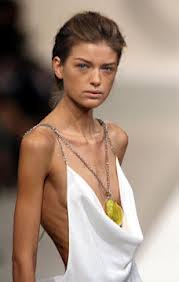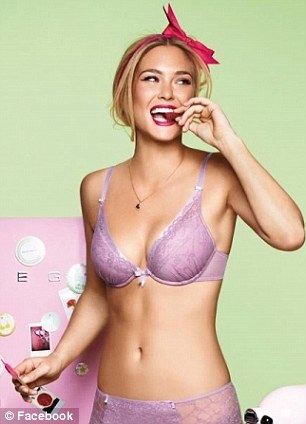Low BMI? No Need to Apply.
Posted in Health and tagged with BMI, healthy image, models on 01/03/2013 11:38 pm by CC

Models. Some of us love to hate them and hate to love them. Teenagers want to be them and parents expend immeasurable energy trying to convince teens that modeling is not all it’s cracked up to be. It’s a hard sell, because on the surface, the life of a model appears the thing of which dreams are made.
Models get to wear great clothes, travel the world, have their pictures splashed across the covers of magazines across the globe, and gain entry into some of the most exclusive events known to man. They appear confident and successful. They exude perfection.
You can’t escape them – they’re everywhere and they peddle everything. They’re ambassadors for fashion houses, fresh faces of the latest glamorous cosmetics, and sometimes, they are spokespersons for charitable causes. However, what many of them clearly shouldn’t be are body image role models for young girls and women.
It’s no secret that the modeling world encourages unhealthy eating habits and is a breeding ground for eating disorders. Many of the industry’s stars and wannabes have body mass indexes (BMI) in dangerously low territory. This is why some governments have gotten into the business of modeling. Not literally, but figuratively…no pun intended.
In 2006, twenty-two-year-old Uruguayan Luisel Ramos collapsed and died shortly after exiting a runway. Her death is believed to have been caused by heart failure brought on by her severe anorexic condition. That same year, governments in India and Italy subsequently enacted laws banning underweight models. Two years later, in 2008, popular fashion week production companies in Madrid and Milan banned models who failed to meet minimum BMI standards, 18.0 and 18.5, respectively.
The industry still has a lot of work to do as it works to reform its image, but Israel’s government isn’t willing to wait any longer.
On January 1, 2012, a new Israeli law banned advertisers from using models whose BMI’s are too low. The minimum BMI for models in Israel is now 18.5. To put that into relatable terms, a 5’10” model must weigh at least 129 pounds to be considered healthy enough to get work as a model in Israel. Models must produce a medical report showing they have maintained a healthy BMI for three months prior to a photo shoot or runway show. The law also bans companies from using airbrushing techniques to alter the appearance of their models to make them look thinner than they really are. Finally, advertisers who use software to digitally alter images must clearly mark them as such.
Critics argue that BMI laws do not take into account the genetic disposition of some models who just can’t seem to gain weight despite their best efforts.
While I’m not a fan of big government, I applaud lawmakers in India, Israel, and Italy for having the courage to legislate healthy body images in advertisements. The United States and other countries could take a page out of their books.
What do you think? Are governments trampling upon the rights of ultra-thin models who seek work? Are they limiting the creative authority of advertisers? Is more legislation needed? Share your thoughts here or on my Facebook page.
CC

Israeli model Bar Refaeli – BMI 18.8



January 10th, 2013 at 8:32 pm
Great news! This article is now a featured post on BlogHer. Stop by to join the conversation!
https://www.blogher.com/low-bmi-no-need-apply?wrap=blogher-topics/health&crumb=17
January 11th, 2013 at 11:26 pm
First,I love your blog. Secondly, that whole anorexic model trend makes me absolutely crazy! As if the body images that the women of the world have been bombarded with for decades weren’t bad enough.
To me this doesn’t represent the femanine model of youth, beauty and sexuality but instead, it represents the glorification of eating disorders and death
January 12th, 2013 at 10:57 am
Thanks for your kind words about the blog, Phil! I really enjoy yours as well. BTW, your sister is an absolutely woman inside and out – so inspiring.
I agree, that the unhealthy, deathly appearance of many models is the glorification of eating disorders. As you know all too well, eating disorders are mental illnesses that require psychological treatment – not fame and fortune.
Exploitation of models who clearly suffer from mental illness makes me believe that the people who run fashion houses and marketing companies have warped realities of beauty themselves. Why else would they choose to have these women represent their products?
I live by the “money talks” standard. If I don’t like what a company or product represents, I keep it moving and spend my hard-earned money elsewhere. If more people did this, the modeling industry would have to evolve.
March 17th, 2016 at 5:21 pm
I dunno if anyone will see this, since article is old. But, still:
Beauty is, still, in the eye of the beholder. What we see in advertising doesn’t define our societal consensus off what is beautiful. Rather, the images that sell are a reflection of our consensus.
And, by advocating governments to take a position, one is really saying that society-at-large will not be allowed to define beauty for itself. Instead, a few elites will dictate to society what will be acceptable. This is a chilling perspective. Think nazi book burning and similar situations arising from ceding control to governments.